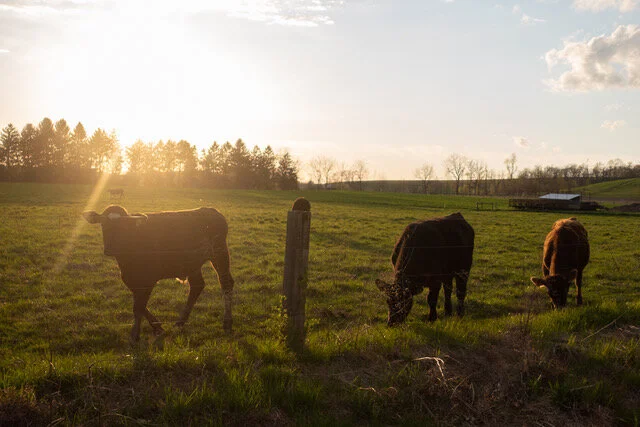A few years ago, I discovered my “new” favorite organization, the Rodale Institute. Rodale Institute not only coined the word “organic,” but is also a pioneer in regenerative organic farming that’s helping to combat climate change.
Organic + Regenerative Organic
But Amy, when I was a kid, organic food wasn’t a thing!
Well, if you were born after 1950, it’s likely you grew up eating food grown with synthetic pesticides or fertilizers in the soil without even knowing it. In fact, USDA Certified Organic only became an option in 1990, and is still gaining notoriety with only 1% of U.S. cropland certified as organic.
Organic food means that your produce was grown in soil with no synthetic pesticides or fertilizers for three years prior to harvest. For livestock, it means that the animals were given organic feed, and given no antibiotics.
Regenerative organic farming takes this one step further, working with nature to use photosynthesis and healthy soil microbiology to draw down greenhouse gases.
With the use of cover crops, compost, crop rotation and reduced or zero tillage, regenerative organic farming practices actually sequester more carbon than is currently emitted, tipping the needle past carbon neutral to carbon negative!
Rodale Cows
I was recently able to go back to Rodale Institute and the infamous cows I talked about in 2017 when I first toured the farm. Since that time, the cows, the farm, and the farmers have thrived.
Up until 2017, Rodale Institute’s next-door neighbors -- a commercial dairy farming family -- were in financial trouble and the pressure from the bank was so severe that the father was nearing his breaking point (an unfortunately common circumstance for many farmers today).
Rodale Institute's leadership was determined to help and struck up an offer -- let his cows out of the barn to graze on the Institute's 333 certified organic acres and help them create an instant organic market for their cows.
If their cows did not increase dairy yields, Rodale Institute would cover the bank’s demands completely. When the cows were let out on Rodale Institute’s pasture, not only were they ecstatic to be freed from captivity, but their milk yields increased by 30% and the family was able to pay all their bills as organic farmers and stop paying veterinary bills with healthier, pastured cows.
Rodale Institute’s farmers were psyched because the cows were grazing and playing and pooping out in the fields, which helped the soil get even healthier and full of microbiota and fungi. And because the microbiology of the soil was consuming carbon, keeping it out of the atmosphere. This is regenerative organic farming in action.
Cut to 2021:
The next-door neighbors no longer pay rent for the farm, they bought it outright and will pass it on to their kids.
Rodale Institute’s scientific team has been able to study the cows in their meticulous grazing program and are documenting how the cows are improving the soil health.
The family was able to buy an $850K grain mill and is now running a thriving organic business selling grain all up and down the Eastern Seaboard.
They’ve inspired others! So much so that acres and acres are being leased up by farmers in their religious community who see the transition to organic as a lighthouse for them too!
As a result of this catching on near Rodale Institute, Pennsylvania is now the third-highest state in organic sales following California and Washington.
As yogis we know that what we put out into the world always comes back around. Good begets good. Our food, our neighbors, our planet, and our selves are all interconnected.
To learn more and help spread the word about Regenerative Organic Agriculture and what it can do to draw down carbon, follow these steps:
Donate! Rodale Institute, founded in 1947, is a 501(c)(3) nonprofit dedicated to pioneering organic farming through research and outreach.
Learn more about how healthy soil = healthy food = healthy people with this fact sheet.
Tell your reps about Regenerative Organic using Resistbot and this template letter!
Regenerative Buying Guide - use this guide to learn about the labels placed on products you buy at the grocery store or online and learn where your food comes from.
Learn about BIPOC Farmer Micro Grants.
Study with Rodale at their virtual campus.
Read Rodale Institute’s newest White Paper which concludes that regenerative agriculture is a win-win-win climate solution that’s ready for wide-scale implementation now.
Watch the movie, Kiss the Ground.
Read the book, Farmacology.
Get to know your local farmers.
Start a garden.
Compost your food!
Photo: Rodale Institute
